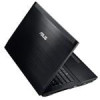Asus ASUSPRO ADVANCED B53J User Manual - Page 23
Wireless Switch on selected models, ExpressCard Slot, E-SATA Port & USB Combo Port, USB Port 2.0
 |
View all Asus ASUSPRO ADVANCED B53J manuals
Add to My Manuals
Save this manual to your list of manuals |
Page 23 highlights
1 Wireless Switch (on selected models) Enables or disables the built-in wireless LAN and Bluetooth (selected models). When enabled, the wireless status indicator will light. Windows software settings are necessary before use. 2 ExpressCard Slot One 26pin Express card slot is available to support one ExpressCard/34mm expansion card.This new interface is faster by using a serial bus supporting USB 2.0 and PCI Express instead of the slower parallel bus used in the PC card slot. (Not compatible with previous PCMCIA cards.) 3 E-SATA E-SATA Port & USB Combo Port External SATA or eSATA allows external connection of SerialATA devices originally designed for use inside the computer. It is up to six times faster than existing USB 2.0, & 1394 for external storage solutions and is also hot pluggable using shielded cables and connectors up to two meters. See USB Port for description. 4 USB Port (2.0) The USB (Universal Serial Bus) port is compatible with USB 2.0 or USB 1.1 devices such as keyboards, pointing devices, cameras, hard disk drives, printers, and scanners connected in a series up to 12Mbits/sec (USB 1.1) and 480Mbits/sec (USB 2.0). USB allows many devices to run simultaneously on a single computer, with some peripherals acting as additional plug-in sites or hubs. USB supports hot-swapping of devices so that most peripherals can be connected or disconnected without restarting the computer. Notebook PC User Manual 23















